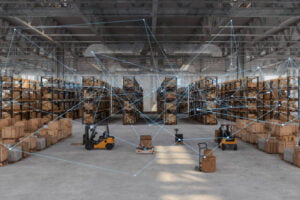Logistics:

In the fast-paced and ever-changing field of logistics and supply chain management, using cutting-edge technologies has become critical for remaining competitive. Among these technologies, artificial intelligence (AI) and quantum computing have emerged as revolutionary forces, changing how organisations operate. This blog post digs into the symbiotic link between AI and quantum computing, looking at their applications and the significant impact they can have on logistics and supply chain optimisation.
The Rise of AI in Logistics and Supply Chains
Artificial intelligence has already made considerable inroads into the logistics industry. Machine learning algorithms are being used to analyse massive volumes of data, allowing businesses to make informed decisions in real time. AI-powered predictive analytics improve demand forecasts, enabling firms to optimise inventory levels, cut expenses, and increase overall efficiency.
1. predictive analytics.
Predictive analytics enabled by AI can predict demand with remarkable precision. Logistics organisations can forecast demand variations and modify their operations based on historical data, market trends, and external variables. This proactive strategy reduces excess inventory and ensures that things are available when and where they are needed.
2. Route optimisation.
AI algorithms optimise transportation routes based on traffic conditions, weather, and delivery deadlines. This not only saves gasoline and transportation costs but also increases overall delivery speed. Real-time route alterations based on dynamic conditions allow businesses to respond quickly to unexpected obstacles.
3. Warehouse Automation
AI-powered robotics and automation technologies improve warehouse efficiency. Automated systems can efficiently choose, pack, and fulfil orders, decreasing human error and speeding up order processing. This automation is especially important in large-scale distribution centres, where efficiency benefits result in significant cost reductions.
Read More: Unveiling a Quantum AI-Powered Self-Driving Cars
Exploring Quantum Leaps in Logistics and Supply Chains

While artificial intelligence continues to transform logistics, the addition of quantum computing ushers in a new era of possibilities. Quantum computers use quantum mechanical principles to process information in ways that classical computers cannot. This opens the door to addressing the difficult optimisation issues inherent in logistics and supply chain management.
1. Quantum Algorithms for Optimisation.
Quantum computers excel at addressing optimisation problems, which are an important component of logistics. Traditional computers fail to cope with the exponential expansion of possibilities as the problem’s scale increases. Quantum algorithms, such as the Quantum Approximate Optimisation Algorithm (QAOA), allow for more efficient exploration of probable solutions, resulting in unparalleled speed in determining optimal routes and resource allocation.
2. Inventory Management.
Quantum computing has the potential to revolutionise inventory management by analysing large datasets and identifying ideal stock levels more precisely. This not only minimises overstocking and stockouts, but it also responds dynamically to changes in demand patterns. Quantum-enhanced inventory management guarantees that resources are properly utilised, reducing waste and increasing profitability.
3. Supply Chain Visibility.
Quantum computing improves supply chain visibility by processing and analysing real-time data on unprecedented scales. This allows businesses to monitor and manage their whole supply chain with greater granularity, recognising potential bottlenecks and correcting issues before they worsen. The result is a more robust and responsive supply chain.
Synergy of AI and Quantum Computing in Logistics and Supply Chains
The ultimate promise of logistics optimisation rests in the combination of AI and quantum computing. By leveraging the characteristics of both technologies, firms may achieve unprecedented supply chain efficiency and resilience.
1. Quantum machine learning.
The integration of quantum machine learning with AI algorithms enables more complex data analysis. Quantum machine learning algorithms can detect complex patterns and correlations in massive datasets, enabling more insight into customer behaviour, market trends, and operational inefficiencies. Companies can now make data-driven decisions with previously impossible precision.
2. Quantum-Enhanced AI Models
Quantum computing can improve the performance of existing AI models by increasing data efficiency. This is especially useful in situations where traditional computers hit their computational limits. Quantum-enhanced AI models can handle larger datasets, making them ideal for the complex and linked nature of logistics and supply chain data.
Read More: 20 AI Tools That Can Transform Your Business
Challenges for Effective Implementation of AI and Quantum Computing in Logistics and Supply Chains

These problems encompass technological, organisational, and legislative issues, and addressing them is critical to realising the full potential of these advanced technologies. Here are some potential challenges:
1. Challenges in integrating AI due to technological complexity and cost:
Integrating AI into current systems can be complicated and expensive. Companies may have issues ensuring smooth compatibility between AI technologies and their existing infrastructure.
2. Quantum Computing Infrastructure:
Quantum computers are still in their early phases of research, and constructing the required infrastructure can be prohibitively expensive. Companies must invest in both hardware and expertise to fully leverage quantum computing capabilities.
3. Improving Data Quality and Accessibility:
Logistics and supply chain data are frequently stored in silos, making it difficult to develop a cohesive dataset for AI and quantum computing applications. Breaking down these divisions and guaranteeing data accessibility throughout the supply chain is critical.
4. Data Privacy and Security: With a greater reliance on data, protecting the privacy and security of sensitive information is crucial. Companies must put in place strong cybersecurity procedures to defend themselves from potential intrusions.
5. Talent and Skill Gap: Lack of Expertise
Quantum computing necessitates specialised expertise, which is currently scarce. Companies may experience difficulties in finding and retaining personnel with the abilities required to develop and deploy quantum algorithms.
6. Data Science and AI Talent:
Demand for data scientists and AI expertise continues to exceed supply. Organisations may struggle to find and keep skilled professionals to design and manage AI-powered logistics solutions.
7. Interoperability and Standardisation Issues:
The lack of standard protocols and interfaces may impede the interoperability of AI and quantum computing technology. Companies may struggle to seamlessly integrate solutions from several vendors.
8. Compatibility Issues:
Ensuring that AI and quantum computing systems work in tandem with existing technology is a key problem. Integrating this sophisticated technology into legacy systems may cause compatibility concerns.
9. Regulatory and ethical considerations:
Data Regulations: GDPR and other strict data privacy requirements can make it difficult to gather, store, and handle logistics and supply chain data. Companies must negotiate complex regulatory environments to achieve compliance.
Ethical AI use: As AI plays an increasingly important role in decision-making, addressing ethical concerns about bias, transparency, and accountability becomes critical. To build stakeholder trust, companies must employ ethical AI practices.
10. Quantum Computing Maturity:
Quantum computers are still in early development, with modest processing capacity relative to their future potential. As technology advances, the scalability and stability of quantum computing solutions must improve.
11. Change Management: Organisational Resistance
The integration of AI and quantum computing may cause employee resistance to change. Companies require effective change management methods to guarantee that their employees accept and adapt to technological advancements.
12. Long implementation timelines: Time-consuming Implementation
Implementing AI and quantum computing solutions may require a large amount of time and resources. Companies must be prepared for potentially lengthy implementation timetables, which will have an impact on how quickly they may realise advantages.
13. Uncertainties in Quantum Computing:
Challenges with “Error Correction Quantum” computers are that they are prone to faults, and incorporating error-correcting techniques increases complexity. Overcoming these problems is critical to ensuring the trustworthiness of quantum-enhanced solutions.
Addressing these issues requires a collaborative effort from technology developers, enterprises, and regulatory organisations. As the field of logistics and supply chain management changes with the incorporation of AI and quantum computing, proactive actions to address these problems will be critical to reaping the full benefits of these disruptive technologies.
Read More: How Quantum-Powered AI is Revolutionising Industries
The Future Landscape of AI and Quantum Computing in Logistics and Supply Chains
As we look ahead, the combination of AI and quantum computing has enormous promise for logistics and supply chain management. The ongoing growth of quantum computing technology, together with the improvement of AI algorithms, will open up new opportunities and redefine industrial standards.
1. Quantum Internet and Secure Communication.
The creation of a quantum internet has the potential to completely transform logistical communication. Quantum key distribution (QKD) uses quantum mechanics to provide secure communication. This might considerably improve the security of sensitive supply chain information, shielding it from cyber threats and ensuring the integrity of crucial data.
2. Quantum-Enhanced Simulation
Quantum computers are more efficient at simulating complicated systems than classical computers. This capacity is essential in situations where modelling real-world logistical processes can help improve decision-making. Quantum-enhanced simulation can model supply chain dynamics, allowing businesses to test various scenarios, identify potential hazards, and optimise their strategy accordingly.
Conclusion
The combination of AI with quantum computing represents a watershed moment in the advancement of logistics and supply chain management. Businesses that use these technologies put themselves at the forefront of innovation, obtaining a competitive advantage in a continuously changing industry. The optimisation of logistics and supply chains using AI and quantum computing is more than just a theoretical possibility; it is a tangible and increasingly achievable reality that will shape the industry’s future. Companies that want to flourish in tomorrow’s logistics market will need to embrace technological convergence.










